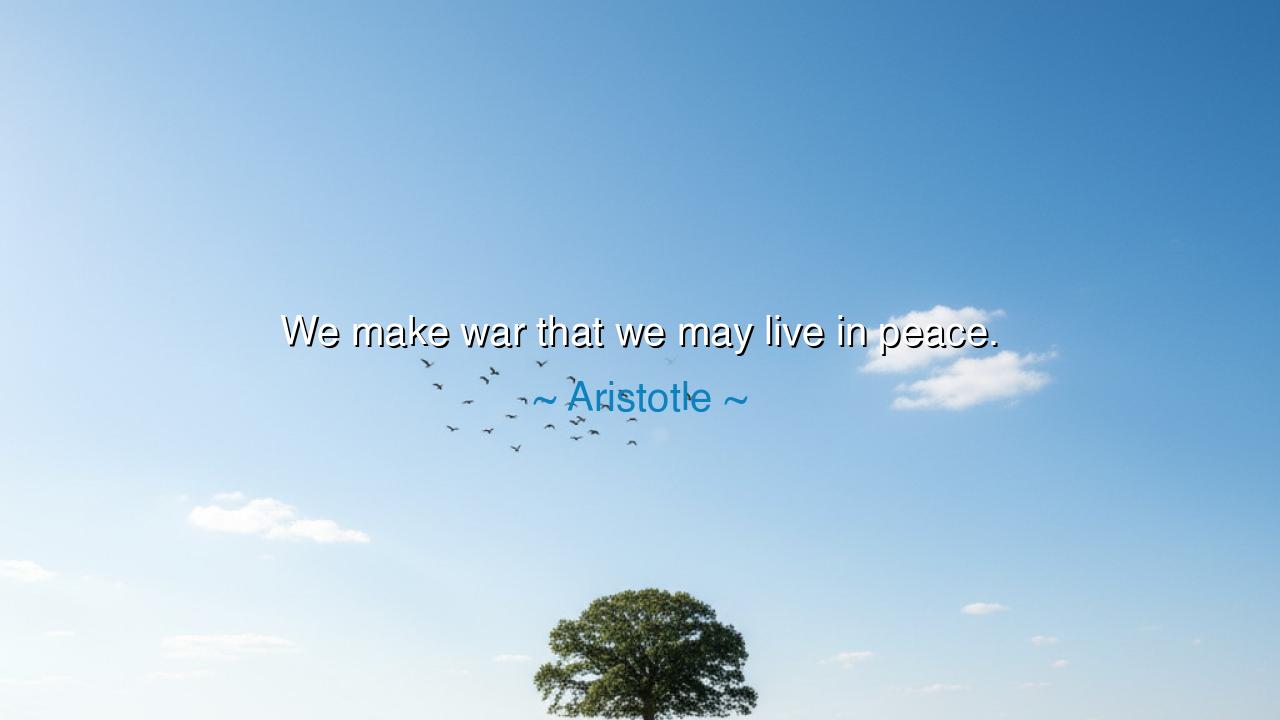
We make war that we may live in peace.






In the wisdom of the ancients, words were not cast lightly, but forged like bronze to endure the ages. So spoke Aristotle, master of reason and disciple of truth: “We make war that we may live in peace.” At first, the words strike the ear as a paradox, for how can strife give birth to harmony, or bloodshed bring forth calm? Yet the sages of old knew well that the world is not sustained by gentleness alone, but by the hard hand of necessity. For peace is not the absence of struggle—it is its fruit.
Consider the city-states of Greece, where men dwelt in constant peril of rival arms. The hoplite, shield in hand, did not march to battle for the love of slaughter, but for the promise that his children might sleep without fear. The farmer who left his plow for the spear did so not to exalt himself, but to preserve his fields from burning and his hearth from ruin. Thus, war was not an end, but a bitter means, and peace the harvest that justified its sowing. Aristotle, in his clarity, saw this truth: that sometimes the sword must be drawn, not for glory, but for the quiet dignity of living free.
We find this lesson again in the story of Rome. When Hannibal crossed the Alps, bringing terror to the gates of the Republic, the Romans did not submit, though they suffered grievous defeats. They rose again, battle after battle, enduring hardship, sacrifice, and despair. Why? Not for conquest alone, but for the survival of their people, for the safeguarding of their laws, for the dream that their descendants might walk unafraid upon Roman soil. Their struggle was not endless; it bore fruit in centuries of stability—the famed Pax Romana, a long season where roads were safe, trade flourished, and wisdom could blossom. The peace was purchased dearly, but purchased it was.
And yet, my children, do not mistake this teaching. The wise do not glorify war, nor raise it as an idol. The wise understand it as a cruel medicine, bitter to drink, yet sometimes the only cure for the disease of tyranny and violence. It is the hand that draws the bow to drive away the wolf from the fold. If men go to war lightly, they are fools and destroyers; but if they go to war with sorrow and resolve, they are guardians of the greater good.
What, then, is the lesson for us who walk not in the armor of hoplites, nor stand in the ranks of legions? It is this: that in every life, there are struggles we must embrace if we wish to attain the treasures of peace. A man who avoids all conflict becomes a slave to fear. A woman who never speaks against injustice inherits the silence of oppression. To live in peace with oneself, one must sometimes wage war against falsehood, temptation, weakness, or despair. The battleground may not be fields of blood, but it is no less real, and no less demanding of courage.
Therefore, let your life reflect this wisdom. If you face hardship, endure it, knowing that endurance is the road to freedom. If you are pressed by injustice, rise against it, even if the struggle is weary, for only in resistance is peace secured. If you are tempted to surrender your principles for comfort, remember that short-lived ease is no peace at all, but a prison. True peace is not given—it is earned through the fires of conflict, whether within or without.
So hold fast to Aristotle’s teaching. War is not the goal, but sometimes the gate. Peace is not the absence of trials, but the triumph that follows them. Let each battle you face, whether in the world or in your heart, be carried with the solemn knowledge that beyond the strife lies the blessing of rest. Fight, therefore, not for the love of fighting, but for the love of that quiet morning after the storm, when the earth is still, the hearth is warm, and the soul at last knows it is free.






AAdministratorAdministrator
Welcome, honored guests. Please leave a comment, we will respond soon